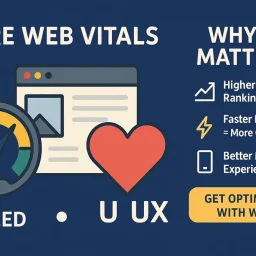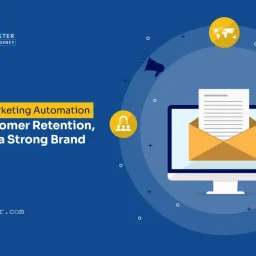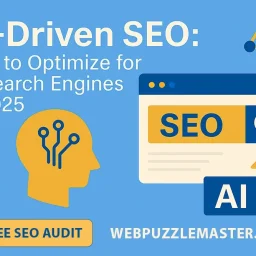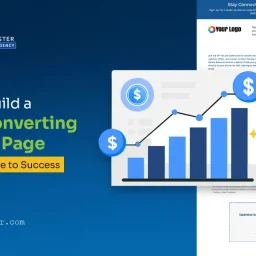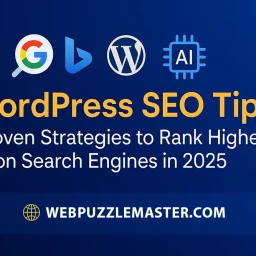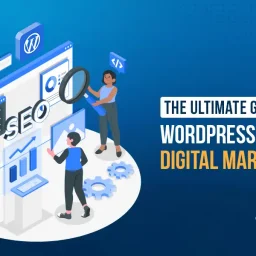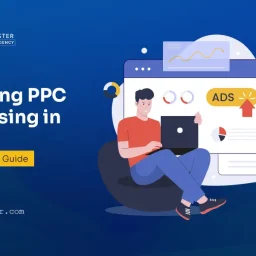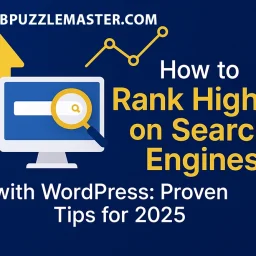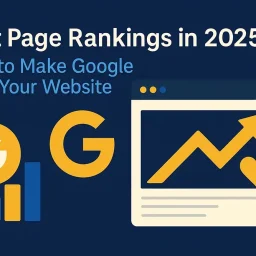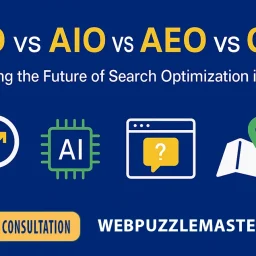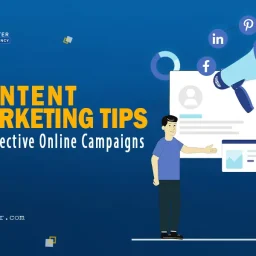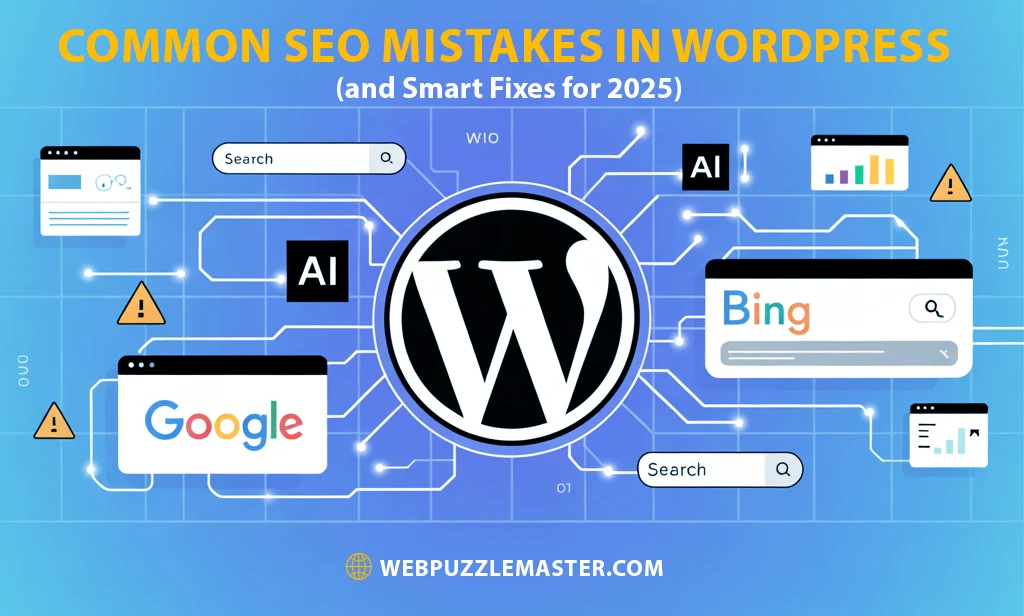
If your WordPress traffic is flatlining, you’re not alone. Even high-intent brands in Florida leak rankings because of preventable common SEO mistakes and overlooked fundamentals. The upside? With disciplined execution and a few targeted SEO Fixes, your pipeline can rebound—fast. This article operationalizes what to watch, what to fix, and how to future-proof your stack.
This article is for local businesses, professional services, and B2B operators in Florida ready to shore up the basics and scale with confidence. Here’s what you will learn:
Key Takeaways
- Pinpoint the common SEO issues that quietly cap your WordPress visibility.
- Eliminate crawlability mistakes that block Googlebot and throttle discovery.
- Stop repeating the biggest SEO mistakes on Core Web Vitals, indexing, and internal links.
- Deploy pragmatic SEO and AI workflows—AI SEO tools that accelerate audits, fixes, and content optimization.
- When targeting Florida prospects, apply a Florida-specific lens with local SEO Florida execution and cross-channel alignment.
- Optimize for both Google and Bing. Chat experiences often lean on Bing’s index—so incorporating Bing keywords protects visibility across AI surfaces and traditional SERPs.
Why WordPress Wins—Until It Doesn’t
WordPress gives you speed to market, plugin extensibility, and content velocity. But the same flexibility creates risk—conflicting plugins, misconfigured themes, and “set-and-forget” habits cause silent SEO Mistakes. If you’re evaluating SEO Services Florida, demand partners who harden your baseline, not just publish more content.
1. Indexation & Crawl Budget: Stop Wasting Googlebot
Symptoms: Pages exist but don’t rank. Coverage reports show “Crawled—currently not indexed.”
Root causes: thin tag pages, duplicate archives, dev/test URLs exposed, or a bloated sitemap.
Action plan
- Lock down archives you don’t need (tags/author/date) with noindex, follow.
- Consolidate duplicates via canonical tags; align sitemap to only canonical URLs.
- Fix Crawlability Mistakes by removing blocked-but-linked pages and repairing broken internal links.
- Run a weekly crawl using AI SEO tools (crawler + LLM summary) to highlight anomalies and AI SEO errors you might miss.
Pro tip: Treat indexation like inventory control. Every URL should earn its keep.
2. On-Page Structure: Headers, Entities, and Intent
Symptoms: You’ve got content, but rankings lag.
Root causes: Title/H1 mismatch, missing entities, or walls of text with no information hierarchy.
Action plan
- Align each page to one primary topic; map titles, H1s, and subheads to search intent.
- Embed entity terms (brands, locations, product types) and clarifying FAQs.
- Build content blocks that answer “jobs to be done”—buyers scan; serve them fast.
- Use WordPress SEO with AI to generate outline variants and detect gaps before publishing.
3. Technical Hygiene: Themes, Plugins, and CWV
Symptoms: Bounce rates spike on mobile; CLS/LCP failures.
Root causes: Heavy themes, render-blocking scripts, unoptimized images, and uncached third-party widgets.
Action plan
- Implement server-level caching + image compression; lazy-load below-the-fold media.
- Trim nonessential plugins; replace multi-plugin stacks with consolidated suites.
- Track Core Web Vitals; hard-gate deployments that degrade performance.
Reality check: Many WordPress SEO Mistakes come from stacking “quick-win” plugins without considering performance debt.
4. Internal Links & Information Architecture: Earned Authority Flows
Symptoms: Category leaders don’t rank; orphaned money pages.
Root causes: Flat navigation, inconsistent anchor text, no hub-and-spoke model.
Action plan
- Create hubs (service categories) that link down to spokes (specific services/locations) and back up.
- Standardize anchors to signal topic clusters to Google.
- Automate audits—use AI SEO tools to surface high-authority pages that should deep-link to underperformers.
5. Local Signals: Florida-First Execution
Symptoms: Competing statewide but only winning in your ZIP code.
Root causes: Weak NAP consistency, thin location pages, GMB posts on autopilot.
Action plan
- Build robust city pages with unique proof (projects, photos, testimonials).
- Tighten NAP data across citations; use structured data.
- Execute Local SEO Florida plays—localized FAQs, neighborhood cues, and service-area schema.
6. Don’t Ignore Bing—It Powers AI Discovery
If you’re only mining Google data, you’re flying half blind. A meaningful slice of AI-assisted discovery routes through Bing’s index and ranking signals. That means your WordPress content strategy needs Bing keyword alignment to win in chat-style answers and SERP features—especially as users ask conversational questions that differ from classic queries.
Why it matters now
- AI distribution effect: Many chat experiences pull from Bing’s crawling and ranking layer. Skipping Bing means fewer at-bats when answers are aggregated by AI.
- Different demand patterns: Bing Keyword Planner exposes variants (entities, long-tails, question forms) that don’t surface the same way in Google tools—great for capturing “jobs to be done.”
- Faster indexing with Index Now: Bing supports IndexNow; shipping URLs immediately after publish/update tightens the feedback loop for testing titles, H1s, and internal links.
Action plan
- Stand up Bing Webmaster Tools and verify your property. Submit XML sitemaps and monitor coverage, crawl errors, and enhancements alongside Google Search Console.
- Use Bing Keyword Planner to build an “AI-intent” list (questions, comparisons, how-tos). Map these terms to FAQs and subheads across templates.
- Implement IndexNow on WordPress (plugin or server-side) to ping Bing on publish, update, and URL removals.
- Cross-check topic clusters: ensure every priority hub/spoke has at least one Bing-validated term in titles, H2s, and anchors.
- Add Bing’s URL inspection to your pre-publish checklist. If discovery lags, troubleshoot internal links and canonicalization before scaling content.
Deliverable you can hand to the team
- One-page “Bing Roll-In” SOP:
-
- Research target page in Google + Bing planners
- Add 2–3 Bing keywords per page (title/H2/body)
- Publish → auto-ping via IndexNow
- Validate in Bing Webmaster Tools within 48–72 hours
- Iterate titles/H2s if impressions stall
-
Bottom line: Including Bing keywords in optimized content isn’t optional—it’s table stakes for AI-era coverage and risk mitigation.
7. Governance: Content, Redirects, and Rollbacks
Symptoms: Rankings dip after a redesign or plugin swap.
Root causes: Redirects missed, meta fields wiped, or robots settings changed.
Action plan
- Maintain a living SEO runbook (redirect matrix, meta governance, robots policy).
- Version control key configs; run pre-launch audits in a staging environment.
- Monitor for any unexpected SEO error signals post-deployment and make corrections fast.
8. AI Acceleration: Faster Audits, Cleaner Outputs
Stop guessing. Make SEO and AI part of your operating model so decisions are based on facts and not guesses:
- Use AI SEO tools to summarize crawl exports, group errors by impact, and propose prioritized fixes.
- Leverage models to draft schema, FAQs, and outline variants you review—not rubber-stamp.
- Pair human judgment with automation to prevent the next wave of SEO Mistakes.
Common SEO Mistakes to Avoid in WordPress
- Thin “near-duplicate” location pages that cannibalize each other.
- Ignoring mobile CWV while focusing on design that affect load time and user experience.
- Publishing without internal link placement rules.
- Treating sitemaps as “everything we’ve ever made” instead of a curated index.
- Neglecting governance—make sure the right things get checked.
Quick Wins: Your First Three SEO Fixes
- Sitemap & robots reset – ship only canonical, index-worthy URLs.
- Internal link retrofit – top 20 pages get 3–5 strategic links to priority money pages.
- CWV cleanup – compress hero images, defer noncritical scripts, lazy-load all media.
FAQs
What are the most Common WordPress Mistakes that hurt rankings?
Bloated plugins, thin/archive duplication, slow themes, and poor internal linking—classic Common SEO Mistakes to Avoid that compound over time.
How often should we audit an SEO Site WordPress build?
Quarterly at minimum; monthly for high-velocity publishers. A stale SEO Site WordPress configuration is a liability.
Do we still need backlinks if we fix on-site issues?
Yes—but authority compounds only if the site is crawlable, fast, and mapped. Otherwise you’re pouring water into a leaky bucket.
Can AI help, or will it create new problems?
Used well, WordPress SEO with AI accelerates audits, schema drafting, and content briefs. Guardrails prevent sloppy automation and AI SEO errors.
Why should we care about Bing if Google is bigger?
Because AI discovery routes through Bing’s index in many chat experiences. Ignoring Bing = missed visibility in AI answers and a portion of traditional SERPs.
Why Choose Webpuzzlemaster
When you engage a Digital Marketing Agency in Florida with a strong brand and reputation, you expect more than checklists. Webpuzzlemaster aligns technical hardening, content strategy, and local execution into one accountable growth motion. As a results-driven Digital Marketing Agency in Florida, we deliver WordPress performance tuning, structured content frameworks, schema implementation, and location-first playbooks engineered for ROI.
If you’re serving a Florida market and looking for SEO Services in Florida, demand provable impact: Mobile page speed and Core Web Vitals, indexation gains, and conversion aligned keyword wins. Our team closes gaps fast and scales what works.
Ready to stop repeating common SEO Mistakes to avoid and start scaling? Book a consult now:



